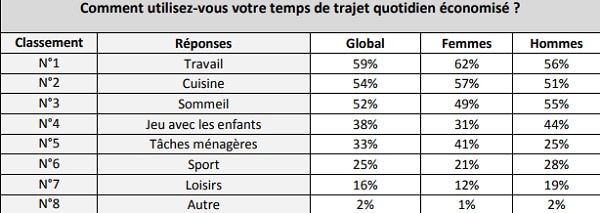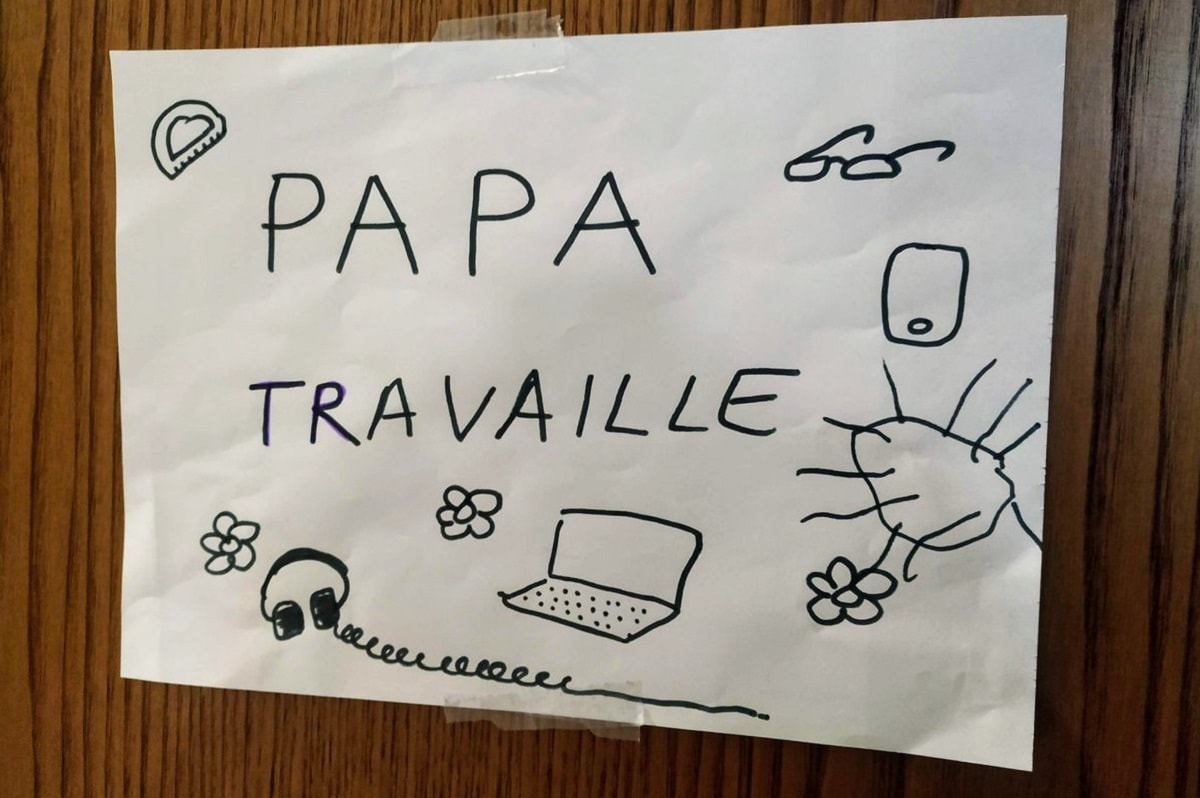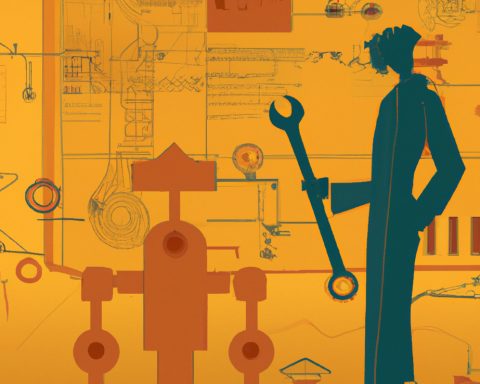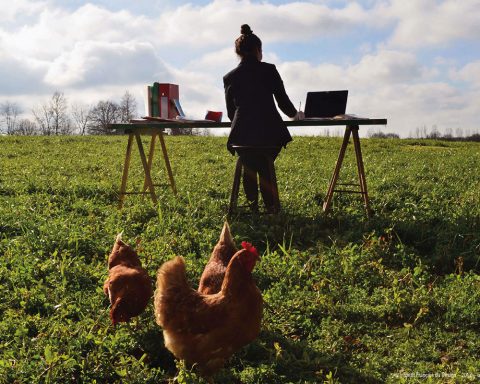A l’heure du Covid-19, 76% des Français en télétravail regrettent déjà leurs bureaux ! Depuis le 12 mars où le Président de la République française a annoncé la fermeture des écoles, crèches et établissements d’enseignement supérieur, les Français et leurs familles vivent confinés. Une situation qui met à jour certaines contradictions de notre société sur les relations entre vie professionnelle et vie de famille.
Après moins de deux semaines de confinement, c’est ce qui ressort d’une étude de Deskeo (1), qui a interrogé plus de 2 736 professionnels au sujet de leurs conditions de télétravail forcé. Une enquête qui montre une situation très complexe.
Home office nation
La grande majorité des Français applique avec rigueur la politique de confinement. Ainsi, moins d’un sondé sur trois (29%) dit continuer à exercer son activité professionnelle sur son lieu de travail habituel. De l’autre côté, 59% des Français déclarent travailler à leur domicile et 11% dans leur résidence secondaire. Parmi ces 70% de télétravailleurs, 89% n’ont pas l’habitude de travailler à distance et découvrent ainsi le home office.


Mal équipés…
Parmi les conseils des professionnels pour s’organiser de manière efficace en télétravail, le fait de disposer d’une pièce dédiée pour s’isoler revient systématiquement. Malheureusement, cette recommandation ne s’applique qu’à une minorité de Français. En effet, plus de 73% des personnes interrogées ne disposent pas d’un espace réservé pour le télétravail.

Quel impact sur le temps de travail ?
En ce qui concerne la durée du temps de travail, la moitié des Français a vu la différence depuis le début du confinement. Ainsi, 32% des sondés ont le sentiment de travailler plus longtemps que d’habitude quand 1 Français sur 5 avoue travailler moins longtemps qu’en temps normal. Pour ces derniers, la baisse d’activité générale observée ces derniers jours partout en France est certainement liée à cette baisse de régime.

La pause déjeuner passe à l’as
Même s’ils sont à la maison, la moitié des Français (49%) actuellement en télétravail forcé avoue faire l’impasse sur le déjeuner. Dans les faits, 37% des sondés déjeunent de façon occasionnelle et 14% continuent de travailler à l’heure du repas.

Plus de temps pour… travailler !
Avec l’élimination de leur trajet quotidien, 59% des Français constatent surtout travailler plus. En revanche, 54% des sondés utilisent ce temps gagné pour cuisiner et 52% pour dormir un peu plus. Parallèlement, 38% en profitent pour jouer avec leurs enfants et 33% pour effectuer les tâches ménagères. Le sport (25%) et les loisirs (16%) sont plus difficiles d’accès en cette période de confinement, même si on constate que les hommes sont globalement plus nombreux à s’accorder du temps pour eux.

Loin des collègues
Pour conserver un lien social avec leurs collègues, 74% des sondés ne font… pas grand-chose. En effet, si 29% communiquent régulièrement par téléphone, très peu de Français utilisent les moyens technologiques à leur disposition pour partager leurs déjeuners (2%), happy hours (2%) ou leurs pauses café (1%) en vidéoconférence.

En manque de bureau
Sans doute que peu de personnes auraient répondu par l’affirmative à cette question en temps normal mais aujourd’hui, plus de 73% des hommes et 79% des femmes avouent regretter leur bureau et leur espace de travail quotidien.

Double peine
En plus de la crainte d’être touchés par le coronavirus, 79% des hommes et plus de 83% des femmes avouent avoir extrêmement peur de perdre leur emploi compte-tenu de la situation actuelle.


L’invasion numérique dans la sphère privée
Au cours des dernières années, les études qui soulignent l’invasion de la vie personnelle par les activités professionnelles se sont multipliées. Dans une étude qui porte sur l’autonomie individuelle à l’ère du smartphone, des chercheur américains montrent comment les individus qui acceptent de répondre à leurs mails en dehors des heures de travail produisent des attentes de réponse à tout moment, qui intensifient leur travail. Ils se retrouvent alors dans l’incapacité de reprendre le contrôle de leur vie personnelle.
Deux professeures de l’école de commerce emlyon business school, Dima Younes, Professeure associée de théorie des organisations, et Ludivine Perray, Professeure associée en finance et comptabilité, ont analysé comment l’annonce de confinement national, qui aurait pu rassurer les parents puisqu’elle visait à protéger leurs enfants, semble avoir provoqué au contraire une panique généralisée.
Les réseaux sociaux relaient des vidéos, des photos et des propos manifestant l’angoisse de se retrouver confinés ensemble. Une vidéo montrant un papa qui se cache derrière un décor à l’appel de sa fille, a été partagée 72 000 fois en trois jours, rien que sur Facebook.
Une affiche virale rapporte : « Je viens d’entendre le Président annoncer la fermeture de toutes les écoles… Rassurez-moi, c’est avec les enfants à l’intérieur ? » Pourtant, nos enfants, nous les aimons. Comment expliquer ces réactions ? Que nous dit l’expression de cette inquiétude à se retrouver en face à face ?
Les nouvelles technologies ont aussi bouleversé le travail dans la mesure où elles ont permis le prolongement des heures ouvrables comme dans les supermarchés équipés de caisses automatiques, ou ont offert la possibilité de travailler à n’importe quel moment sur des plateformes proposant des micro tâches qu’il est possible de faire en attendant le bus, ou sur n’importe quel autre temps mort – comme le soutiennent les promoteurs de ces modèles.
A contrario, les lieux de travail ne se sont pas rendus plus flexibles ni plus perméables à la vie de famille. S’occuper de ses problèmes familiaux comme on peut s’occuper des problèmes professionnels chez soi – c’est-à-dire, de manière transparente – n’est certainement pas légitime sur le lieu du travail. On dit rarement à ses collègues de nous laisser un instant pour régler des soucis familiaux.
La famille et, en particulier, les enfants doivent rester invisibles à l’employeur. Ce dernier peut même développer des solutions comme les conciergeries ou les crèches d’entreprise pour que, justement, ces éléments ne viennent pas perturber le bon fonctionnement des affaires.
Lorsque les salariés ne parviennent pas à rendre leur vie personnelle invisible, ils subissent des sanctions. Les inégalités de salaire entre homme et femme en sont le symptôme le plus visible – ne serait-ce que parce que la femme procrée et non l’homme.
Frontière de la vie privée
Cette volonté de rendre sa famille invisible à son employeur est accentuée avec l’autonomie professionnelle : plus nous avons de l’autonomie, plus nous chercherons à rassurer notre employeur sur notre dévouement et nos disponibilités pour nos tâches professionnelles, et plus nous chercherons à rendre notre famille invisible.
La faible participation des cadres à des événements organisationnels comme « le sapin de Noël » témoigne de cette volonté de cacher sa vie familiale – et donc, son indisponibilité pour le travail – à son employeur. Certes, on entend certains (plus rarement certaines) évoquer la sortie de l’école de temps en temps, mais ces discussions restent rares. Elles visent d’ailleurs plutôt à se rendre sympathique et à donner une image plus humaine lorsque la performance professionnelle n’est pas remise en cause.
Tant que la technologie permettait de répondre à des mails sans que notre entourage professionnel ne s’incruste chez nous, rendre la famille invisible était encore possible. Maintenant, lorsque la visioconférence s’invite chez nous, cela devient impossible, encore moins nos curieux enfants qui défilent devant notre caméra lors de nos réunions virtuelles. Pour montrer leur dévotion à leur travail, certains choisiraient alors de faire croire qu’ils veulent s’en « débarrasser ». D’où les mises à distance qui abondent sur les réseaux sociaux depuis une semaine.
Reconnaissance personnelle
Le deuxième grand mécanisme à l’œuvre est celui de la gratification. Dans une étude sociologique qui vise à comprendre pourquoi les parents disent que leurs enfants sont leur priorité alors qu’ils travaillent des heures supplémentaires sans même qu’on ne le leur demande, Arlie Hochschild souligne l’intérêt de s’arrêter sur le concept de « reward », qui renvoie à une forme de récompense en français.
Elle montre que les salariés américains ne font pas toujours des heures de travail supplémentaires à la demande de l’employeur, ni par besoin financier, mais parce qu’ils en retirent plus de reconnaissance. Pour illustrer ce propos, elle rapporte la parole d’un père de famille qui souligne l’impossibilité du dialogue avec son adolescent alors qu’il a des rapports fluides avec ses collègues.
L’autrice montre que ces personnes se persuadent progressivement de leur indisponibilité, et commencent à imaginer ce qu’elles auraient fait si elles avaient plus de temps, à se créer des personnalités imaginaires. Le confinement nous enlève cette échappatoire qu’est le travail.
Cercle vicieux
S’il existe des personnes qui peuvent encore décider de leurs heures de travail, il reste que, dans le système capitaliste actuel où tout le monde est en compétition avec tout le monde, ceux qui restent longtemps pour fuir leurs problèmes familiaux obligent les autres à suivre…
Concernant les tentatives de réconciliation de la vie de famille et de la vie professionnelle, le terme d’épuisement revient souvent. Le défi n’est que plus grand si nous devons, en plus de notre travail, nous occuper de vos enfants, faire la classe à la maison, cuisiner pour tous les repas, faire le ménage plus fréquemment puisque tout le monde est là, et gérer le bien-être et les émotions de toute la famille.
De manière générale, l’épuisement provoque une surconsommation qui vise à la recherche d’un soi que nous n’arrivons pas à construire dans le temps qui nous est imparti. C’est la raison pour laquelle nous prenons des abonnements dans des clubs de sport alors que nous n’arrivons même plus à trouver l’énergie pour y aller, nous achetons des livres que nous savons ne pas avoir le temps de lire, nous couvrons nos enfants de jouets en espérant les mettre à distance, etc.
En perte de notre soi au milieu de ce chaos, nous faudra-t-il consommer pour nous « retrouver », et donc travailler plus dans l’espoir de gagner plus pour pouvoir maintenir ce cercle vicieux infernal ?
Cette trêve du temps capitalistique nous permettra-t-elle de sortir de ces cercles vicieux ? Pour l’instant, nous continuons à agir comme si de rien n’était. Mais combien de temps résistera-t-on ? La précarisation n’arrangera probablement pas les choses. Le marché du travail deviendra plus compétitif.
L’avenir nous dira si les malheurs provoqués par la crise sanitaire accentueront ce cercle vicieux, ou si la trêve nous permettra de ralentir la cadence et de trouver d’autres modes de vie, d’autres façons d’être et d’exister, et de retrouver l’équilibre entre la famille et le travail.
(Source : The Conversation, partenaire éditorial de UP’ Magazine, 24/03/2020)
(1) Méthodologie de l’étude : enquête réalisée auprès de 2 736 professionnels répartis sur l’ensemble du territoire français, effectuée en ligne, sur le panel propriétaire BuzzPress France, selon la méthode des quotas, durant la période du 19 au 24 mars 2020.
Profils des personnes interrogées : 21% d’indépendants, 79% de salariés. Nombre de salariés : 24% de 1 à 10, 36% de 10 à 50, 32% de 50 à 200 : 8% plus de 200.
Répartition des secteurs d’activités concernés : Assistanat, Administration : 6% / BTP, Chantier, Bureau d’études : 6% / Commerce, Marketing, Vente : 17% / Conseil : 8% / Direction générale, Direction centre de profits : 5% / Informatique, Télécoms : 17% / Restauration, Tourisme, Hôtellerie, Loisirs : 14% / Santé, Social, Service à la personne : 9% / Production, Maintenance : 1% / Environnement, Aménagement : 1% / Distribution, Magasin : 5% / Gestion, Finance, RH, Comptabilité, Audit : 6% / Métallurgie, Mécanique, Aéronautique : 1% / Logistique, Achat, Stock, Transport : 3%, Agri-Agro – Agriculture, Viticulture, Pêche : 1%.
Toutes les informations mises en avant par les personnes interrogées sont déclaratives.












